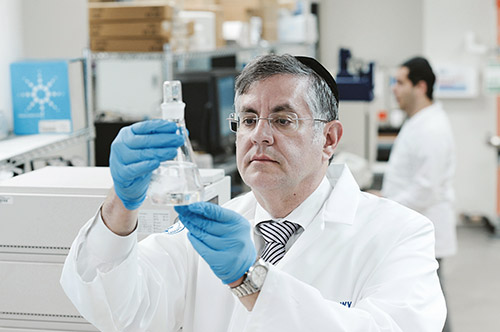
(Courtesy of Touro College) Millions of Americans take medications to control their chronic pain, but people have a wide range of responses to these drugs, and some people are more susceptible to their side effects, such as nausea, vomiting, respiratory depression and addiction. These differences are largely based on genetic differences in the way people metabolize drugs.
A new study by researchers at Touro College of Pharmacy, led by Dr. Zvi Loewy, demonstrated that doctors can successfully tailor the type and dose of pain medications to individual patients based on testing their genetic profile, a process known as pharmacogenomics. This type of personalized medicine could vastly improve the treatment of chronic pain patients.
Genetic variations contribute to a person’s response to drugs. Studies suggest that CYP2D6 is the primary gene at work in the metabolism of pain medications. Some people are poor metabolizers of pain medications, like codeine and tramadol, and should not be prescribed those meds.
In the study, published this week in the Journal of Personalized Medicine, 107 chronic pain patients were initially prescribed pain medication. They then underwent pharmacogenomic testing and doctors personalized their treatment based on the results. The majority of people in the study—80%—received a change in their pain medication.
Of the 346 prescriptions, 115 (33%) were discontinued, 58 (17%) were maintained but the dose, frequency or way the drug was delivered was changed, and 174 (50%) remained the same. After testing, 70 new prescriptions for pain medications were added.
Due to these changes, the proportion of people with intense pain nearly halved, from 10.5% to 5.7%. People with moderate to severe pain saw a slight increase in their pain, but it was not statistically significant. People with mild pain did not see a difference in pain.
“Although some groups did not experience a change in their pain level, the changes to the medications likely result in a reduction in the incidence of side effects and help to avoid addiction to pain medications,” said Zvi G. Loewy, Ph.D., associate dean of research and professor in the department of pharmaceutical and biomedical sciences at Touro College of Pharmacy.
“Pharmacogenomic testing is poised to contribute significantly to pharmacotherapy for several indications including cardiovascular, oncology, psychiatry and pain management as demonstrated in the current study,” continued Loewy.
The Touro researchers collaborated with pain expert Alexander Weingarten, M.D., the co-director of Comprehensive Pain Management Associates, in Syosset, New York.










